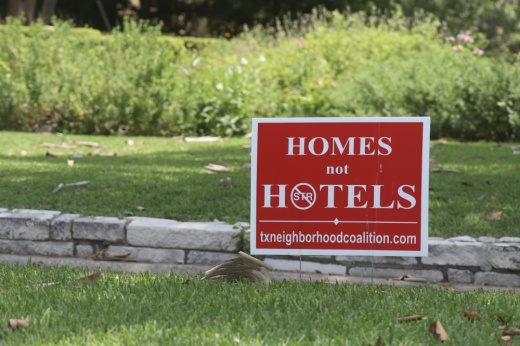The new rules include a zoning ordinance that makes it illegal to operate short-term rental homes in areas zoned for single-family homes. The plan is popularly known as the “KISS,” or ”keep-it-simple solution,” option.
What happened
During its June 14 meeting, City Council approved the Dallas City Plan Commission’s recommendation, which it discussed in April, to zone short-term rentals out of single-family neighborhoods. Short-term rentals, such as those listed on Airbnb, will still be allowed in areas that are zoned for multifamily use, but each unit must include at least one off-street parking space. In April, city staff estimated the city has about 1,800 registered short-term rentals and 1,300 that are unregistered—the ordinance will make up to 95% of them illegal.
Before the vote, City Council heard from dozens of community members, many of whom wore white “Homes not Hotels” T-shirts in opposition of short-term rentals.
Quote of note
“The penultimate question tonight is who we want our neighborhoods to be for—long-term residents or transient tourists? I think the answer should be obvious,” District 14 Council Member Paul Ridley, who represents parts of east Dallas, said during the meeting. “It is time to take decisive action to preserve the quality of life in Dallas neighborhoods and not to delay any longer what residents tonight and previously have been clamoring for.”
Ridley has been an avid supporter of banning short-term rentals. During the meeting, he said wealthy investors outbid residents on Dallas homes so they can operate short-term rentals as an additional source of income, which makes housing “less affordable for everyone.”
The backstory
Short-term rentals opponents and operators alike have waited years for City Council to decide how to regulate the properties. City Council was scheduled to vote on an ordinance in April, but the vote was delayed to conduct additional research.
Many have called for an outright ban on short-term rentals, repeatedly voicing concerns about the rentals bringing unwanted noise, traffic and safety hazards to the neighborhoods they live in. Short-term rental operators have asked for stricter regulations rather than a ban on the properties, which would impact a major source of income for many operators.
While the plan commission recommended handling short-term rental usage through the zoning change, Dallas Planning & Urban Design Department staff recommended June 9 that City Council address short-term rentals through the registration process instead. They asserted that “major concerns related to [short-term rentals] are operational and would be best managed through a registration ordinance enforced by Code Compliance Services,” according to a June 9 memo.
The conditions
In addition to the zoning change, City Council also voted to require short-term rental operators to register their properties with the city annually and pay registration fees.
Occupancy will be limited to three people per bedroom with a maximum occupancy of 12 people per rental unit. Other rules include noise limits between 10 p.m. and 7 a.m. and a one-hour response time for emergency concerns.
The June 14 vote did not include penalties for operators who don’t register their properties with the city. Earlier in June, Dallas Code Compliance Department staff said the zoning ordinance will be difficult to enforce due to limited staff and a lack of resources.
The zoning ordinance goes into effect immediately, but code staff said it could take a minimum of six months before they can start enforcing the new regulations. Even then, their enforcement may rely mostly on responding to complaints from residents rather than actively monitoring potential violations.





